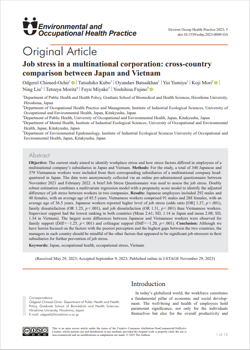#E0069 Equal but Different: Work-Related Stress in Cross-cultural Settings

Equal but Different: Work-Related Stress in Cross-cultural Settings
In this global economy, it is meaningful that workers’ physical health and mental well-being are fundamental to a company’s success. Health and well-being require a holistic approach in its implementation. Despite best efforts, health disparities occur because of weak organizational support systems or a worker’s situation. Hence, occupational health practices to mitigate workers’ work-related stress should align with organizational growth.
In this research, investigators examined the roles of physical and non-physical factors that influenced disparities in workers’ stress. The test sites were Japanese and Vietnamese subsidiaries of a multinational corporation headquartered in Japan. Both companies had the same organizational policies. Previous research reported Japanese workers as undergoing high levels of work-related stress (60%) and attributed the rapid growth of the Vietnamese economy to workers’ high occupational stress (89.6%).
Over four months, data was collected from the test sites using the Brief Job Stress Questionnaire (BJSQ). The 57-item checklist assessed job stressors, stress responses, and buffers and consisted of a Japanese and Vietnamese version. Socio-demographic data showed Vietnamese were predominantly female (76%), younger (30-39; 46.4%), and involved in labor-intensive occupations (69.1%) while the Japanese worked primarily in white color occupations (68.5%), had older workers (50-59; 36.5%), and the longest working years (>30; 37.4%).
The Vietnamese reported higher job and family life satisfaction, respectively (95.51%; 98.94%). The Japanese reported greater job fitness (2.99%), and a sense of reward (2.98%). Both groups perceived the quantity of workload as a cause of stress, as was supervisory support. The deficiency in supervisory support was attributed to managers exhibiting Japanese stoicism and Vietnamese hierarchy. Conversely, support from colleagues and family was more positive, although the Vietnamese scored higher possibly because of cultural context. Japanese workers reported a lower degree of control (2.91%) than Vietnamese workers which the researchers attributed to their more relaxed approach to life. Undoubtedly, how workers perceived and managed workplace stressors stemmed also from cultural conditioning.
Overall, the research provides invaluable information to organizations about the disparities in job-related stress, and the causes for this division. Companies should be encouraged to be more proactive and inclusive in promoting strategies to protect workers’ well-being.

Link to the original journal article:
https://www.jstage.jst.go.jp/article/eohp/5/1/5_2023-0009-OA/_article
Title of the paper:
Job stress in a multinational corporation: cross-country comparison between Japan and Vietnam
Authors:
Odgerel Chimed-Ochir, Tatsuhiko Kubo, Oyundari Batsaikhan, Yui Yumiya, Koji Mori, Ning Liu, Tetsuya Morita, Fuyu Miyake, Yoshihisa Fujino




